The Unification Church Infiltrated Japan's Government. Now Its Sights Are Set on the U.S.

Reverend Sun Myung Moon gestures dramatically as he speaks at New York's Madison Square Garden. His chief associate, Col. Bo Hi Park, right, translates from Korean to English. Credit - Bettmann Archive/Getty Images
It was 11.29 a.m. beneath pewter skies in Japan’s southern city of Nara when Shinzo Abe was handed the microphone. The nation’s former prime minister, wearing a navy blue jacket and crisp white shirt, stepped atop the small, red dias outside Yamato-Saidaiji railway station to muted applause. Some 15 meters away stood Tetsuya Yamagami, face mask slung below his nostrils, hands on hips, looking disinterested. As Abe began his campaign speech in support of his local Liberal Democratic Party (LDP) colleague, Yamagami drifted away, only to reappear seconds later directly behind the entourage. Some two minutes and 25 seconds after Abe had picked up the mic, a gunshot rang out, blanketing the scene in thick white smoke. Abe looked around in confusion. Another shot three seconds later caught Abe in the neck and chest. He collapsed. Yamagami was tackled by security and arrested. A homemade firearm was recovered from the street.
The facts of July 8, 2022, are as indisputable as they are shocking. Abe was taken by medical helicopter to Nara Medical University Hospital, where he was pronounced dead. Yamagami, 41 at the time, has been charged with his murder and awaits trial later this year. He claims that he was motivated by Abe’s support for the controversial Unification Church, which by convincing his mother to donate over 100 million yen ($670,000) drove his family into bankruptcy and destitution. “In some ways, this young man is a victim rather than an aggressor,” says Tark Ji-Il, a professor and expert on the Unification Church at Busan Presbyterian University.
In the months following Abe’s assassination, an internal investigation revealed that half of LDP lawmakers had ties to the church, prompting a slew of resignations from the highest levels of the Japanese government. But why did a religious curiosity—cutely dubbed the “Moonies” and best known for mass weddings and anticommunist fervor—spark such murderous rage? And how did it burrow so deep into the governing elite of the then world’s third-largest economy that a purge was necessary?
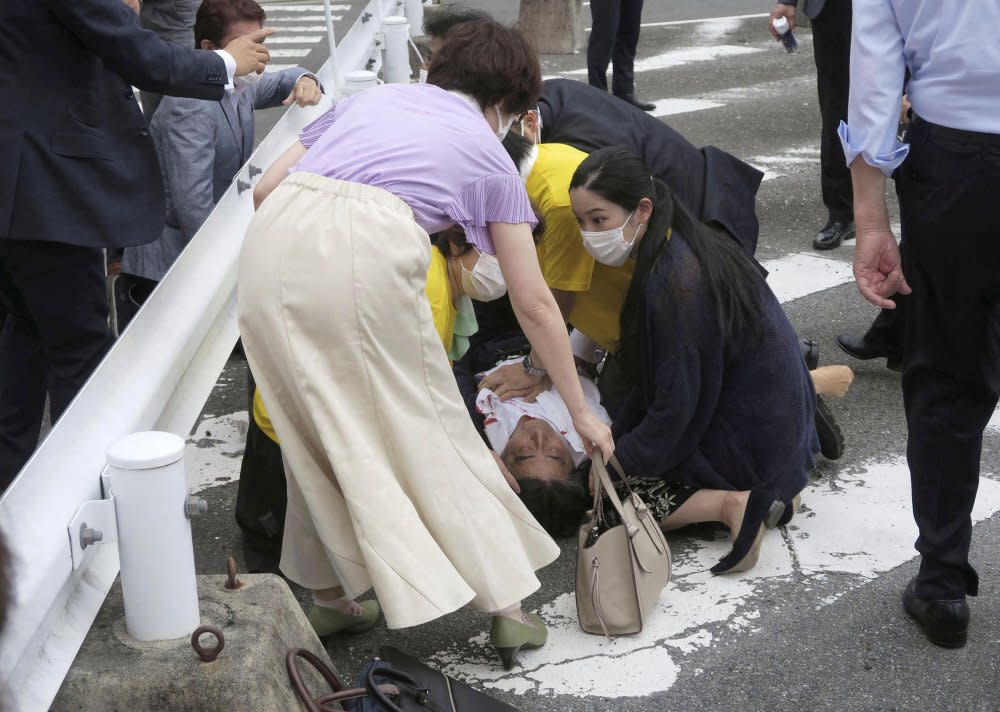
The truth of the Unification Church goes far deeper than one assassination and Japan. It is a web of political and business interests that sprawls over every continent, claiming some two million members (although that figure is highly disputed) and over $1 billion in assets. It owns the Washington Times newspaper, the UPI news wire, the New Yorker Hotel in Manhattan, a ballet company, and True World Foods, the single largest supplier of fresh fish to the American sushi industry. According to U.S. intelligence reports, it helped fund third-world coups. It courts leading Republicans and Democrats with events promoting conservative causes. U.S. presidents including Richard Nixon, Ronald Reagan, and Donald Trump have been outspoken supporters.
The Unification Church was founded in 1954 by Rev. Sun Myung Moon, who preached that Jesus had entrusted him as the second messiah to complete the task of establishing God's kingdom on Earth and bringing about world peace. Moon’s theology rests on the notion that Eve was seduced by Satan in the Garden of Eden before sleeping with Adam. Followers could cleanse this “original sin” bloodline by marrying a spouse of his choosing and engaging in a series of rituals, including having sex in a variety of preordained positions beneath portraits of Moon in a room liberally sprinkled with salt.
Such peculiarities, alongside a focus on a single leader with divine pretensions and an aggressive harvesting of money, have fed accusations that the Unification Church is a cult. Moon cast himself as the “perfect Adam,” and Korea the “Adam nation,” which with assistance from “archangel” nation America would help humankind reclaim its prelapsarian purity. Japan, meanwhile, was cast as the “Eve nation,” which is required to pay for sins committed during the nation’s 1910-1945 colonial rule of the Korean Peninsula. “They believe all the assets of the Japanese have to be returned to Korea,” says Takashi Yamaguchi, a lawyer who has represented many former church members in Japan. “That is the way to salvation.”
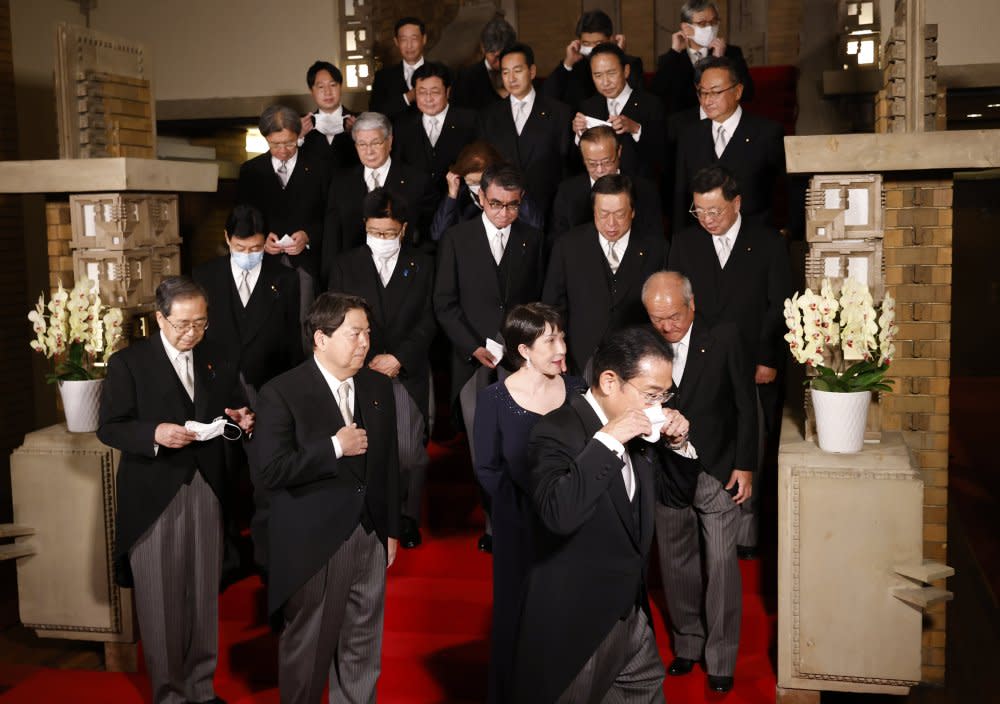
Today, however, the church is struggling to save itself. It’s become a crucible of infighting, tragedy, and sociopathic palace intrigue worthy of the HBO hit Succession. As the church has gotten richer, feuding over its assets has become more bitter and rancorous. Speaking to TIME, Moon’s youngest son, Sean, put the blame for Abe’s murder firmly at the door of his estranged mother, Hak Ja Han, who wrested control of Unification Church after Moon’s death in 2012. “It’s the hammer of judgment upon an organization that has betrayed the Lord and returning Jesus,” says Sean, who set up his own gun-toting splinter Sanctuary Church in rural Pennsylvania and was tear-gassed among the pro-Trump mob outside the Capitol on Jan. 6. “The idolatrous and heretical direction … brought a curse upon that organization.”
Certainly, the death of Abe presents an existential challenge. On Oct. 13, the Japanese government requested a court strip the Unification Church of its status as a religious corporation and thus exemptions from corporate and property taxes. An estimated 70% of the church’s worldwide funding comes from Japan, where in addition to aggressively soliciting donations, it sells overpriced “psychic” ginseng tea and marble vases that supposedly “appease” ancestral spirits. According to a survey conducted by Japan’s National Network of Lawyers Against Spiritual Sales, there were 34,537 cases regarding Unification Church fundraising reported to bar associations and consumer centers across Japan from 1987 to 2021, amounting to over $850 million in damages. “They basically use Japan as their ATM,” says Sarah Hightower, a researcher on cults.
With that revenue stream now under threat, the Unification Church has shifted its focus to the U.S., where aggressive fundraising tactics are shielded by the First Amendment. In October, Hak Ja Han returned to the U.S. for the first time in four years to hold “special workshops” to “understand True Mother's heart” in Las Vegas. The event billed for 17-to-40-year-olds was dominated by the need to increase financial donations to supplement falling revenue from Japan. A leaked email obtained by TIME instructed American followers to send $100 dollar bills to an address in Schaumburg, Illinois “to let True Mother know how much we appreciate her,” with further instructions to “do not say cash on the document.”
A separate leaked Zoom meeting from Sept. 26 hosted by Rev. Demian Dunkley, president of the Unification Church’s U.S. wing, the Family Federation for World Peace and Unification International (FFWPUI), outlined various crises the organization was facing and urged pastors to triple tithing from American members to make up for the drop from Japan. “Start with the highest donor and work down,” Dunkley said. The “main objective” going forward is “membership growth” and “financial growth,” he said. “If a struggling-to-eat family in Nepal, who doesn't even know if they could feed their children, can give a true love offering to True Mother once a year, then I'm telling you that your American families can do this.”
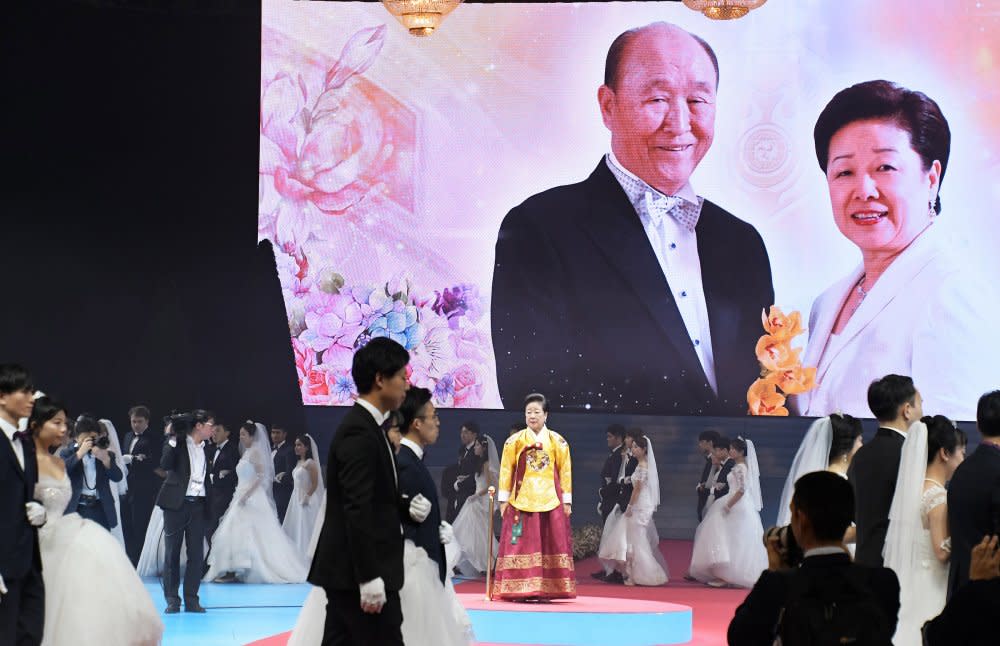
In the meeting Dunkley goes on to admit that “90% of the [Japanese] population agrees with the dissolution” of the church, while friendly “parliamentarians around the prime minister”—who he describes as “our people”—say that “there's probably no way to escape this.” Given these headwinds in Japan, American pastors were to focus on recruiting “youth,” Dunkley instructed, as well as enlisting “the billionaires and millionaires that Mother told us to meet so we can solve all of these problems quickly.”
For Elgen Strait, who grew up in the Unification Church but now hosts the Falling Out podcast to help recovering members, the message is very clear: “Japan is shutting down the money spigot so they are turning to the U.S.” And as what promises to be a close-fought presidential election approaches in the fall, the Unification Church’s political and financial muscle is up for grabs to whoever best serves its agenda.
The Unification Church has long defied definition. Although part of the tsunami of new religious movements from Hare Krishna and Transcendental Meditation that swept the West during the 1960s and 1970s, it stands out for both its longevity and influence. Still, it’s so far shown none of the murderous proclivities of ISIS, the Manson Family, or the People’s Temple of Jim Jones. Many Unification Church members drift in and out of the movement for decades. Any harm it inflicts is more insidious.
Born in what is today northwestern North Korea in 1920, Rev. Moon grew up in a thatched hut during the brutal Japanese occupation. When he was 10, his family converted to Christianity, and at age 16 he claimed to have been visited by Jesus Christ. After Allied forces liberated Korea in 1945, he moved to Soviet-controlled Pyongyang, where three years later he was arrested and spent five years in a communist prison camp.
After the Korean War broke out, Moon escaped across the border and settled in the South Korean city of Busan, living in a one-room shack. He began formulating his theological credo—a mix of Christianity, Confucianism, shamanism, and anti-communist vitriol—scrawled on its mud walls. During the 1950s, Moon’s band of devoted acolytes grew, helping him found a bevy of church-affiliated foundations and businesses. In 1960, at the age of 40, Moon married his second wife, Hak Ja Han—the daughter of his cook—who was just 17 years old at the time. In 1963, Moon also set up the Tongil Group business conglomerate —Tongli is Korean for “unification”—and quickly diversified into arms, farming, ginseng, shipbuilding, aeronautics, tourism, minerals among other enterprises.
“He struck me as being quite humble close up,” says Mike Breen, a former church member who wrote an unofficial biography of Moon. “You got a feeling of somebody very, very attentive, who really focuses on you for that moment that he's dealing with you.”
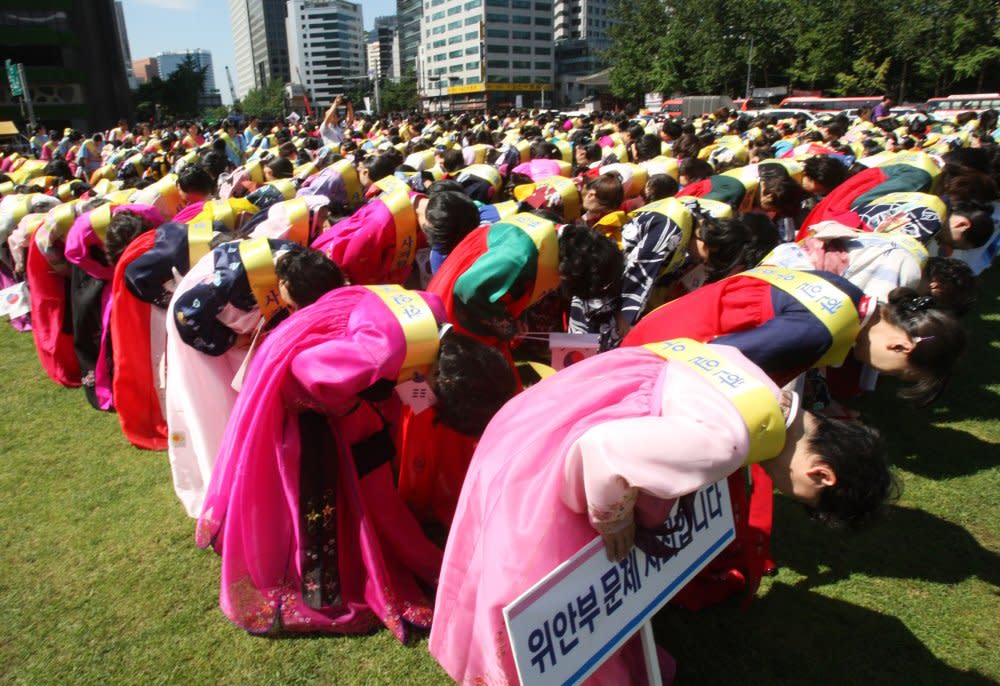
By 1973, Moon had brought his mission to the U.S., settling in a 18-acre wooded estate called East Garden in Tarrytown, New York. There, he set up a new community where alcohol and drugs were off-limits and sex outside marriage condemned the sinner to fiery damnation. By 1974, the U.S. church was reportedly raking in $8 million a year, allowing Moon to purchase the New Yorker Hotel and adjacent Manhattan Center two years later. The art deco buildings became the church’s base of American operations and where children of church members were cared for communally. Strait grew up in the New Yorker until he was three years old, after his parents were “love bombed” by recruiters trawling college campuses. “So many families lived in that hotel,” he recalls. “It’s where people went out on fundraising and proselytizing missions.”
The Unification Church became infamous for spiriting young men and women away from their families to isolated camps where they were allegedly “brainwashed” (which the church denies.) However, the zeal of conversions prompted concerned relatives to launch "deprogramming" abductions and lawsuits to rain down on both sides. Moon also began backing conservative political causes. At the height of the Watergate scandal, he purchased full-page pro-Nixon ads in newspapers across the U.S. and held “God Loves Richard Nixon” rallies on Capitol Hill. Moon dispatched attractive female devotees to charm senators and gather intelligence. One even became an aide to House Speaker Carl Albert.
In 1976, a Congressional investigation implicated Moon as party to a South Korean intelligence operation attempting to sway U.S. policy against the communist North. In 1982, Moon was convicted of tax evasion and sentenced to 18 months in prison. Moon worked to cast himself as a martyr persecuted for an unconventional faith, drawing support from a range of civil libertarians and religious conservatives, including Jerry Falwell and Tim LaHaye. In order to refine his influence efforts, Moon founded the Washington Times newspaper, whose first issue was published the day before his conviction, turning it into a must-read among conservatives, including President Ronald Reagan.
Moon’s espousing of religious freedom and anticommunist zeal won broad support in the febrile Cold War atmosphere of the day. In Latin America, he founded the Confederation of the Associations for the Unification of the Societies of the Americas, or CAUSA, which according to U.S. intelligence sources, sent cash and supplies to Contra rebels and funded the motley band of paramilitaries, cocaine cartels, and fugitive Nazi war criminal Klaus Barbie—the “Butcher of Lyon”—who orchestrated the right-wing coup that toppled Bolivia’s democratically elected government in 1980.
Even the end of the Cold War didn’t stymie Moon’s extraordinary political influence. In 1995, former President George H.W. Bush and his wife Barbara gave a series of paid speeches to the Unification Church in South Korea, and a year later Bush traveled to Buenos Aires to address the launch of Moon’s new regional daily paper, Tiempos del Mundo. Other notable associates include former President Gerald R. Ford, Republican Senator Jack Kemp, Mikhail S. Gorbachev, as well as now disgraced entertainer Bill Cosby. In 2000, Moon purchased a swathe of land in Paraguay almost the size of Delaware; local law enforcement accuse the Unification Church of using it to facilitate arms and drugs smuggling. (The Church says that it is aware of illegal activity on its land though denies involvement and insists it cooperates with law enforcement.)
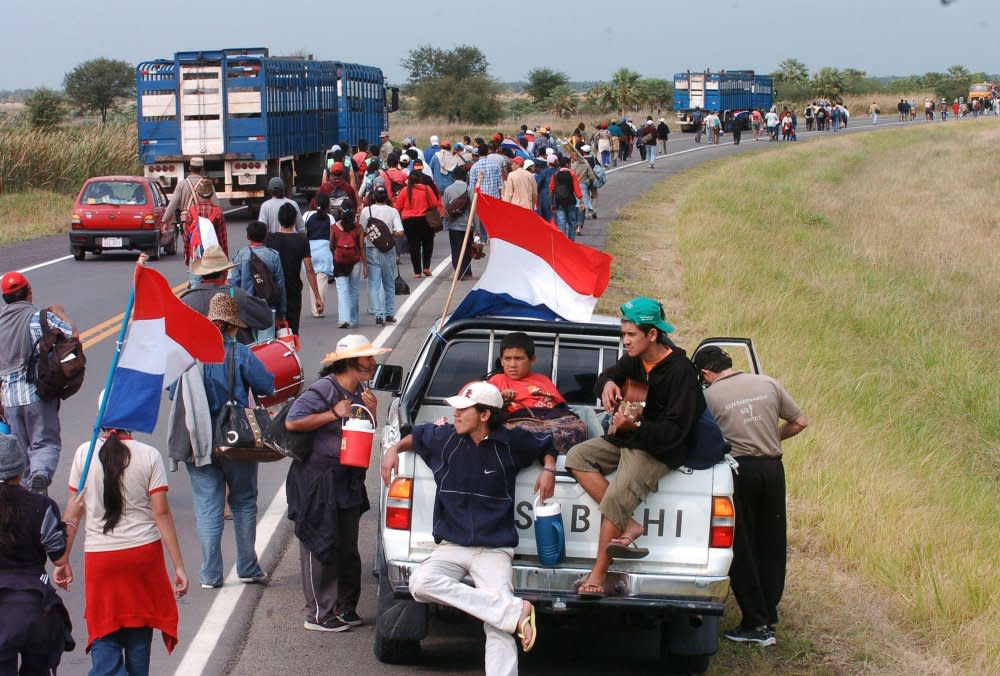
As the Unification Church’s political ties grew, so did the brazenness of its propaganda. In 2003, the Washington Times ran a double-page spread that claimed all 36 deceased American presidents had acknowledged Moon’s preeminence. Thomas Jefferson, meanwhile, had penned a personal endorsement from beyond the grave: “Follow the teachings of Rev. Sun Myung Moon, the Messiah to all people.” The following year at least a dozen U.S. lawmakers attended an elaborate ceremony in the Dirksen Senate Office Building, where Moon was “crowned” and declared himself “humanity's savior, messiah, returning Lord and true parent.” Jesus, Buddha, Hitler, and Stalin had been “reborn as new persons” through his teachings, the several hundred guests were told.Republican Roscoe Bartlett bowed before Moon and Hak Jan Han, while Democrat Danny Davis brought forth a pillow bearing a golden crown for his head. In 2006, President Joe Biden’s brother, James, together with his son, Hunter, purchased a hedge fund founded by Moon’s son-in-law, James Park.
But not all was well behind the scenes.
In 1984, Moon’s second son, Heung Jin, died aged 17 from injuries sustained from a car accident. In 1999, another son, Young Jin, killed himself by jumping from a 17th-story hotel room in Reno. Meanwhile, Moon’s eldest son and heir apparent, Hyo Jin, was known as volatile with a penchant for drink, drugs, and random violence. In 1995, his wife, Nansook Hong, broke from the family and wrote a book condemning Hyo Jin as an adulterous womanizer addicted to cocaine and pornography and who regularly beat her, including when she was seven months pregnant. Hyo Jin died of a heart attack in 2008, aged 45. “Full grown adults have been bowing to the Moon children since they were born, so they treated people like toys,” says Teddy Hose, a recovering church member whose parents were leading members of the American Unification Church and grew up nearby East Garden. “They were just a very sociopathic family.”
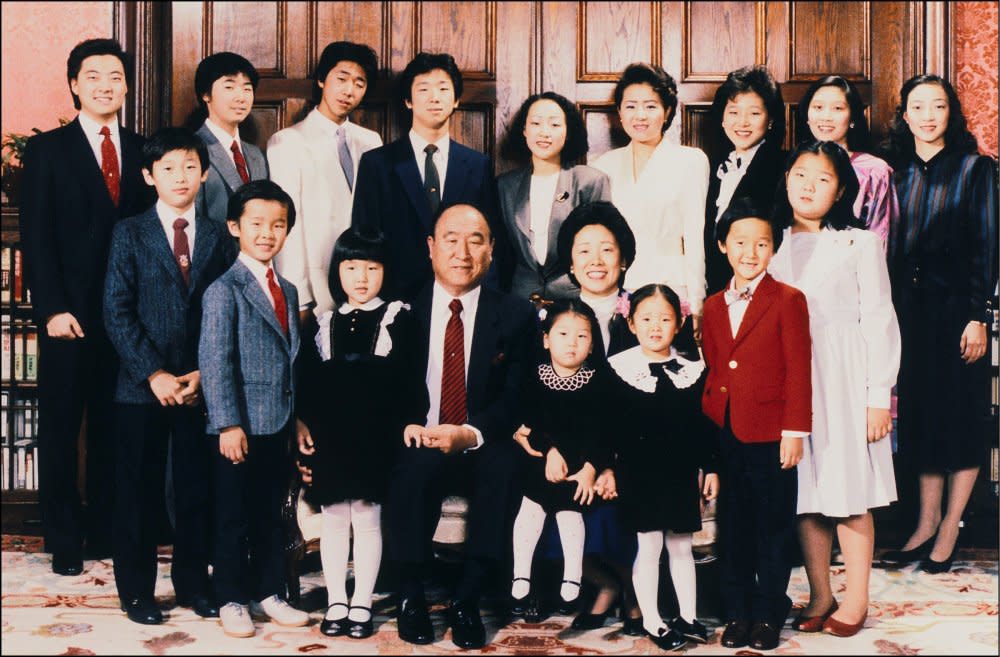
The idolatry of the Moon family stands in stark contrast to the experience of ordinary members. While aggressive fundraising is most acute in Japan, similar stories to Yamagami’s impoverished childhood can be found wherever the Unification Church has a following. It was because of her mother’s devotion to Moons in Oslo, Norway, that Lillian Holdhus grew up “really, really poor,” she says.
Moon teaches that everyone’s ancestors are in hell and followers must pay to liberate each generation. The official website for the Unification Church’s South Korean headquarters, known as Cheon Won, even has an “ancestor liberation” calculator with varying prices depending on country (the underworld evidently adhering to a Westphalian conception of statehood and contemporary GDP metrics). To liberate all 430 generations of one’s family—paternal and maternal—requires $12,420 in Norway or the U.S., but just $2,280 in Sudan. Tellingly, in Japan, the same feat requires 6,520,000 yen ($44,800). There are additional fees for blessing ancestors, liberating the souls of babies lost through miscarriage or abortion, and even the chance to pre-liberate one’s own soul before death. (But only for those whose ancestors have all already been saved.)
Holdhus’s mother became obsessed with saving all her ancestors, sending her children out every evening after school to deliver newspapers between the ages of eight to 15 to earn cash for the family. On Sunday, Holdhus and her siblings were dragged out of bed at 4 a.m. to deliver newspapers before worship. Holdhus never saw a penny of the money—it all went to the church. “I remember being one of the really slow readers at school,” she says. “Because I was too tired to do homework after already working.”
Other than aggressive fundraising, Unification Church is best known for arranged mass weddings. In 1982, 2,075 couples were wed by Moon at Madison Square Garden, brides in lace and satin gowns and grooms clad in identical cobalt suits. In 2012, when she was just 17, it was Holdhus’s turn. She was sent to Cheon Won to take part in what turned out to be the last mass “blessing” conducted personally by Moon before his death. He matched her to a 20-year-old Italian man who lived in Nuremberg, Germany. It wasn’t exactly love at first sight. “He just gave me such a bad impression straightaway,” says Holdhus. “I was like, ‘no way am I marrying this person.’”
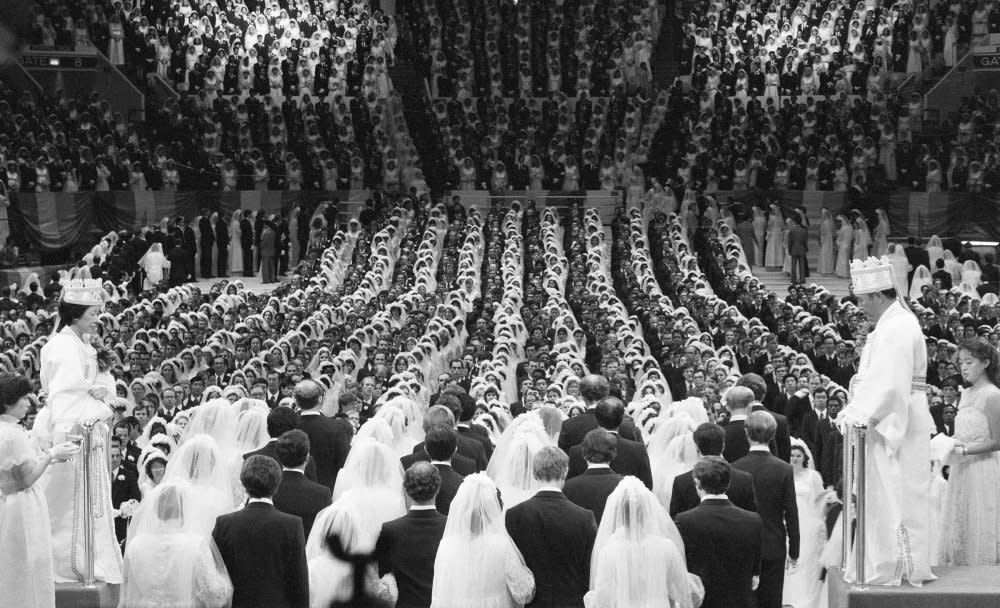
But when Holdhus tried to back out, a church official showed her a contract she had signed saying she was willing to participate in the event. “She was annoyed at me and I felt very pressured,” says Holdhus. “So I said that I'd go through with the marriage ceremony.” Today, Holdus is clear about what transpired. “I was trafficked,” she says resolutely. “I couldn't make decisions for myself legally as an adult.” (Asked about allegations of trafficking, Dunkley pins the blame for any coercive practices on the parents of participants, insisting “the vast majority have an incredible experience.”)
Holdhus returned to Oslo to finish high school but after graduation was ordered by her mother to join her new husband in Germany. “He was mentally abusive, would call me stupid and slow,” she says. “He was not supportive or empathetic at all.”
The toil didn’t stop after marriage. At her new husband’s bidding, Holdhus spent three months touring Italy, Slovenia, and Germany in a van with eight other teenagers, selling trinkets like greetings cards and wax candles door-to-door to earn money for the church. Sometimes they slept inside the vehicle, other times on the floor of community centers or, on rare occasions, crammed into a single room of a hostel. For food, the team leader would buy cheap bread, ham, and cheese from the supermarket to make sandwiches.
“I just remember getting dropped off in this random North Italian village with a little piece of paper with a sentence written on it,” Holdhus recalls. “I don't know the language and I'm feeling really panicked.”
Each morning, all the participants had to state their goal for the day, which had to be higher than the previous one. And every evening, they would have to count out their takings in front of the group before handing them to the leadership. “I usually made about 200 euros [$220] a day,” says Holdhus. “I wasn’t even one of the good earners.” Those who collected the least were shamed in front of their team. “So there’s real pressure to earn more and more.” (Asked about the scheme's focus on fundraising, Dunkley insists "it's actually not really even about the money, but rather ... education."
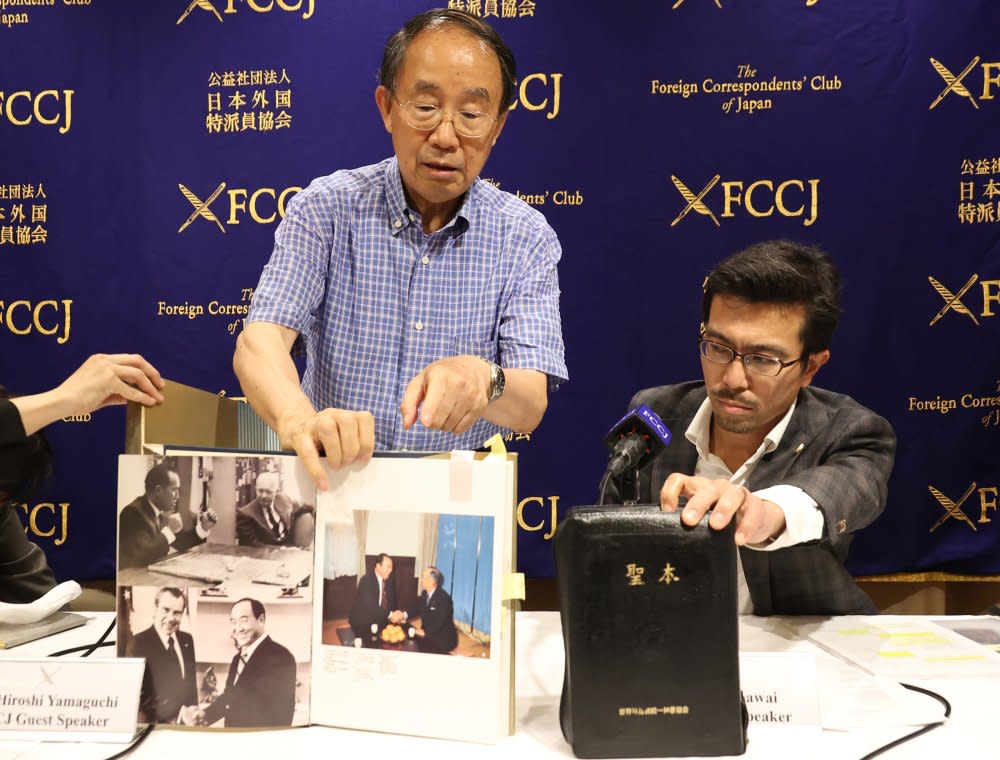
Holdhus’s experience is far from unique. Children who grow up in the American Unification Church, including Strait and Hose, take part in similar schemes—originally dubbed Special Task Force—typically for a year or two after high school, selling meaningless gewgaws like keychains and windchimes. It’s dangerous work; in 2002, 18-year-old Jin-Joo Byrne was sexually assaulted and murdered in a Charlotte apartment building while selling costume jewelry for the church. A few years later, Special Task Force was rebranded Generation Peace Academy, yet it continues to dispatch around 200 young people annually across the U.S. alone to hawk overpriced calendars and 3-D cat pictures even during pandemic lockdowns. The American program is estimated to generate over $10 million annually. “They glorify this program so much,” says Holdhus. “Then I realized it's just labor trafficking.” (Speaking to TIME, Dunkley again denied accusations of trafficking, saying funds raised are “invested into the program or given back to local communities.”)
The lawyer Yamaguchi says the Unification Church runs these programs because “young people don't have that much money, so they're after their labor instead. The harm is that they have been made to waste their most fruitful years.”
After five years of deteriorating mental health, including anxiety disorder and agoraphobia, Holdhus walked out on her husband and returned to Oslo, much to the annoyance of her mother. “She kept saying, ‘you should get back together with him,’” she says. After a while, however, her mother relented. “But every time I was at church, she's trying to match me with some random older person like I was just a commodity to her.”
Holdhus’s mental health continued to spiral. “They believe all this crazy stuff like evil spirits are trying to control you,” she says. “If you drink a sip of alcohol, it's an invitation for your body to get invaded. I just couldn’t take it anymore.” In the end, the pandemic came to her rescue. Lockdowns provided the excuse not to physically attend church services and the mental space to start researching the organization online. “I started asking why they want so much money from the members?” she says. “My whole childhood I heard nothing but, ‘the Moons needs our money!’”
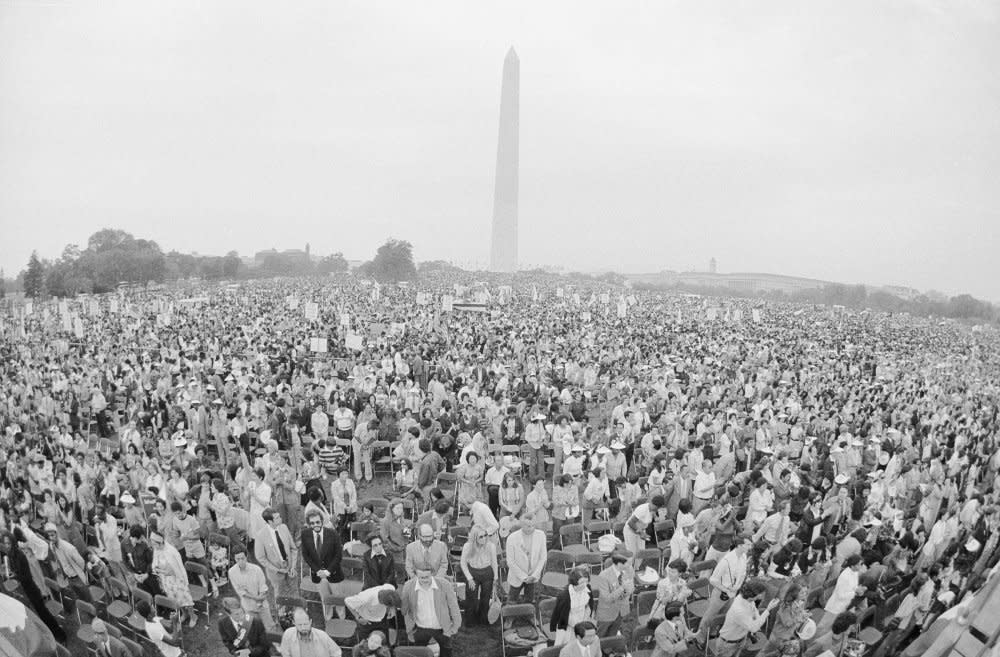
The Unification Church’s focus on donations has intensified as family infighting has decimated its coffers. In 1998, Moon anointed Preston, today his oldest surviving son and a former Olympic equestrian, vice-president of FFWPUI. In 2006, he was also named president of Unification Church International (UCI), a nonprofit incorporated in Washington D.C. to handle church assets. Preston’s future as heir appeared sealed.
But in 2008 he wrote a letter to his parents criticizing the church’s direction. In response, Moon replaced Preston as vice-president of the FFWPUI with Sean. That same year, Moon’s third daughter, Tatiana, was appointed head of the U.S. Unification Church. Sidelined from the mainstream organization, Preston instead founded the secular non-profit Global Peace Foundation, with a stated mission to promote “an innovative, values-based approach to peacebuilding.” But he remained chair of the UCI owing to a personally handpicked board of directors and in 2011 was sued by his mother for donating some $500 million of assets to an unaffiliated Swiss foundation. The case continues to rumble through America’s courts and was listed as one of the current “crises” in Rev. Dunkley’s leaked Zoom call from Sept. 26. “We have sometimes been soft because it is a family matter,” he said, “but no more.”
The power plays escalated following Moon’s death in 2012. Tatiana was forced by her mother to resign after it emerged that she’d borne a child from an affair (detractors accuse Hak Ja Han of leaking the scandal herself). The following year, Hak Ja Han also succeeded in ousting Sean, who set up the World Peace and Unification Sanctuary Church—better known as the Rod of Iron Ministries—in rural Pennsylvania, where he today denounces his mother as the “whore of Babylon.” Preston and Hak Ja Han declined multiple requests from TIME for interviews. Sean, however, was happy to jump on a Zoom call. “My father put his crown on me three times, twice in Korea and once in America, just to make it clear who his successor was,” he seethes.
Hak Ja Han’s consolidation of power created a schism that tore apart friendships, marriages, and families. While most followers stayed with Hak Ja Han’s mainstream Unification Church, some followed Preston and others joined Sean, who allied with another brother, Justin, the founder of a small arms company called Kahr Arms. The guest of honor at Kahr Arms’ Tommy Gun Warehouse showroom opening in 2016 was Eric Trump, while Justin used the event to tell attendees, “I hope we can all agree Hillary Clinton should never be president of the United States” to raucous applause.
Guns play a defining role in Rod of Iron Ministries, which elevates the Second Amendment to divine benediction. Followers young and old clutch firearms—typically the AR-15—during services, while Sean has taken to wearing a crown of bullets. He points out that his father had invested in arms manufacturing in Korea since the 1960s. Still, Sean’s empurpled sermons denouncing public schools for indoctrinating children with “the homosexual political agenda” earned a Hate Watch designation by the Southern Poverty Law Center. To Sean, the biggest enemy to freedom is the state, and he remains firmly convinced the 2020 election was stolen from Trump. “Over history, the most tyrannical force that committed the greatest genocides upon the earth are actually centralized, totalitarian governments.”
Now, Sean’s upstart is rivaling its illustrious progenitor for political influence. It holds regular Freedom Festivals that are packed with right-wing speakers ranging from conservative Republicans to social media conspiracy celebrities. At the latest event on Oct. 7-8, which featured a booth by far right militant group the Proud Boys, Sean rapped on stage about putting pedophiles in “the wood chipper.” The event also featured a ceremonial burning of a pansexual Pride flag and a speech by former Trump official Seb Gorka. Previous years have featured former Trump adviser Steve Bannon, ex–NRA spokesperson Dana Loesch, and Pennsylvania state senator Doug Mastriano. Rod of Iron recently purchased a 30-acre compound near Waco, Texas, and a 130-acre “training center” on a mountain in eastern Tennessee, which Sean says will be their future headquarters. On Jan. 26, Sean posted a video on X of himself and Justin schmoozing with Donald Trump Jr. and former Republican presidential nomination candidate Vivek Ramaswamy at a party in Trump Tower.
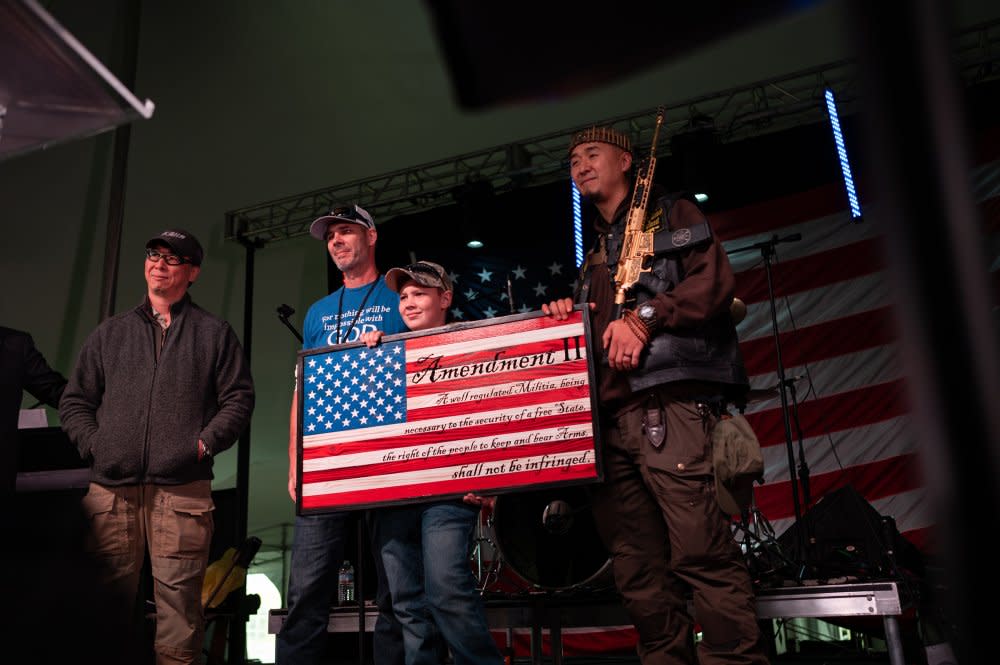
Today, the mainstream Unification Church and its splinters compete for endorsement from the American right. Dunkley’s leaked Zoom call also revealed a ramping up of political influence operations in “America centering on the work of the Washington Times.” On Aug. 12, 2022, former CIA director and Secretary of State Mike Pompeo and former Speaker of the House Newt Gingrich addressed a Unification Church-front Universal Peace Federation (UPF) event in Seoul to mark the 10th anniversary of Moon’s death. Trump, meanwhile, sent a video message that described Moon as a “true inspiration” and Hak Ja Han as a “amazing and wonderful woman.” According to financial records, Trump received around $2.5 million to make that and two other video appearances between 2021 and 2022, while former Vice President Mike Pence was paid $550,000 for speaking at a UPF event. In May, Trump sent another video message to a UPF event.
Strait says the Unification Church leadership twists such paid endorsement “as proof of the divinity of mission” to coerce more donations from its members. The effect is circular: the more donations the church can solicit, the more it can spend on attracting high profile patronage, which it then leverages to attract more donations.
It’s a playbook borrowed straight from Japan, where the Unification Church's establishment-shielded fundraising has already been implicated in Abe’s murder in a nation with little crime and few firearms. Now the Moons are seeking similar political cover, riches, and—most importantly—recruits in the country with the world's highest gun ownership plus over 20 times the per capita murder rate of Japan. "What happens in 20 years when these kids realize that people in places of power helped screw up their lives?" asks Strait. "Is there going to be another explosion of rage aimed at even bigger targets?"
Tragedy has stalked the Moons wherever they have gone. Few can be surprised if it follows their new American adventure, too.
Write to Charlie Campbell at charlie.campbell@time.com.
